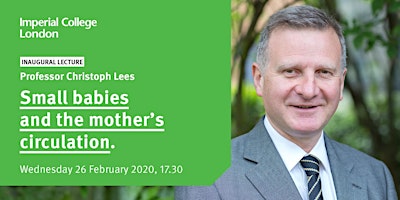You must login before you can post a comment.
- 🍻
Small babies and the mother's circulation
Science & Technology
The lecture is free to attend and open to all, but registration is required in advance.
A drinks reception will follow in the concourse of City and Guilds building.
Abstract
25 years ago it was thought small babies were small because of an abnormally developed placenta, restricting the supply of oxygen. Whilst doctors would usually wait as long as possible before inducing a small baby, it is a more difficult decision if there is a lack of oxygen reaching the fetus because of a malfunctioning placenta.
Christoph Lees is a Professor of Obstetrics at Imperial College London who studies how fetuses grow and how we might be able to address growth restriction within the womb. This included investigating the possibility of screening for small babies based on placental blood flow at a much earlier stage of pregnancy and before the problems manifested themselves. However in the course of these studies evidence emerged that shifted the culpability from the placenta to abnormalities of the heart and blood vessels within the mother.
In his inaugural lecture he will discuss evidence that some mother's abnormal cardiovascular function can not only lead to high blood pressure in the mother (preeclampsia) during pregnancy, but this can also feed through to their baby, restricting fetal growth. He will also explore the opportunities these findings might create for treatment-and prophylaxis in other words reducing the risk of these problems occurring in the first place. It is far easier to address issues within the mother’s cardiovascular system, which work through restricting placental blood flow, rather than attempting to transplant the placenta-something that is never likely to be desirable or possible. These treatments include blood pressure lowering drugs and other novel agents that Christoph will discuss.
Biography
Professor Christoph Lees qualified from Guy's Hospital, London in 1990 obtaining subspecialty accreditation in fetal-maternal medicine under Prof Kypros Nicolaides at the Harris Birthright Centre for Fetal Medicine, King's College Hospital, London. He was research fellow and lecturer for Prof Stuart Campbell at King's College and St George's Hospitals. In 2001 he established the fetal medicine unit at Addenbrooke's Hospital, Cambridge and moved to Queen Charlotte's and Chelsea Hospital as Head of Fetal medicine in 2013.
He was made visiting professor at KU Leuven, Belgium, in 2010, where he continues to work closely with statisticians and obstetricians. Christoph is an international authority on fetal assessment and in particular the use of Doppler ultrasound to assess the health of the baby. He leads research in this area, scanning in labour, and non-invasive fetal surgery. The latter work led to a £2.2 million grant from the Medical Research Council for first in human studies of high-intensity focused ultrasound in 2017. His collaborations include as chief investigator for the TRUFFLE Study in 2002, the latest iteration being the £2.5M NIHR grant for the TRUFFLE 2 study. He co-founded the International Working Group of Maternal Haemodynamics, is a Board member, International Society of Ultrasound in Obstetrics and Gynaecology (ISUOG) from 2015, chairman of the ISUOG Doppler and vascular imaging group and member of the ISUOG Safety Committee. He has a major interest in doctors wellbeing in relation to regulatory and disciplinary proceedings and was a founding member of the RCOG Supporting our Doctors group in 2016.
Please note that Imperial College London processes your personal data in line with the Advancement Privacy Notice. If you have any questions or concerns about this, please contact [email protected]




